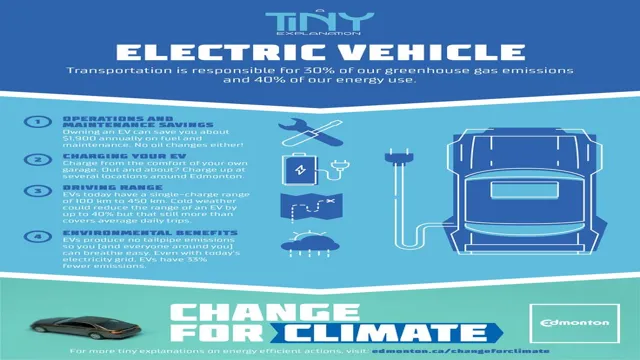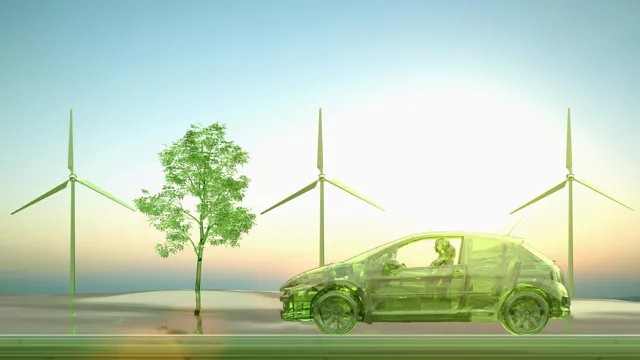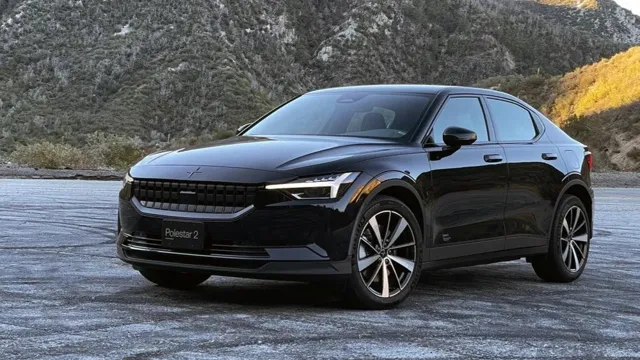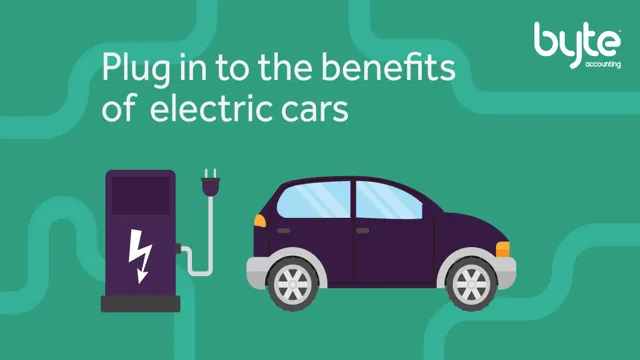Revving towards a Greener Future: Exploring the Environmental Benefits of Electric Cars
Do you ever wonder about the impact of your daily transportation on the environment? With the rise of electric cars on the market, more people are considering switching from traditional gasoline vehicles to electric-powered ones. While electric cars may seem like a promising solution to reduce carbon emissions, we must take a closer look at their environmental impact. In this article, we will explore the pros and cons of electric cars and how they impact the environment.
Are electric cars truly the solution to reduce our carbon footprint? Let’s find out.
Reduction in Greenhouse Gas Emissions
Electric cars and their associated environmental benefits have been a hot topic in recent years as concerns about climate change continue to mount. One of the most significant benefits of electric cars is their ability to greatly reduce greenhouse gas emissions, particularly when compared to traditional gasoline-powered vehicles. By running on electricity, electric cars produce zero tailpipe emissions, reducing the amount of harmful pollutants released into the environment.
This is especially important in densely populated urban areas, where air pollution can have serious health consequences. By choosing to drive an electric car, consumers can help reduce their carbon footprint and take a positive step towards protecting the environment.
Statistics Show Significant Reduction Compared to Gas-Powered Cars
As the world becomes more conscious of the impact of greenhouse gas emissions on the environment, the significant reduction in emissions from electric cars compared to gas-powered cars is a game changer. Statistics show that electric cars produce an average of 4,500 pounds less carbon dioxide per year compared to gas cars. This means that electric cars can go a long way in reducing the carbon footprint and protecting the environment.
It’s a simple yet effective solution to a global problem. Investing in an electric car or hybrid vehicle not only helps reduce greenhouse gas emissions but also saves money on gas expenses in the long run. It’s a win-win situation for everyone.
With more and more car manufacturers introducing electric cars to the market, there has never been a better time to make the switch. We can all play a part in creating a greener future, and driving an electric car is a great step towards achieving that goal.

Lowering Carbon Footprints Through Renewables
Renewable Energy In recent times, there has been an increasing level of awareness about climate change and the vital role renewable energy plays in mitigating its effects. Renewable energy sources, such as solar, wind, hydro, and biomass, are clean and sustainable alternatives to fossil fuels. They not only reduce greenhouse gas emissions, but they also offer numerous benefits to society, such as cost savings, job creation, and improved energy security.
The adoption of renewable energy technologies has increased worldwide, and it’s no doubt making a significant contribution to reducing carbon footprints. In the years to come, it’s expected that renewable energy will play an even more significant role in the global energy mix, and we should continue to push for clean energy adoption to reduce the impact of climate change.
Efficient Use of Resources
Electric cars have become increasingly popular as people seek to reduce their carbon footprint and limit their impact on the environment. These vehicles offer a range of environmental benefits due to their efficient use of resources. Unlike traditional gasoline-powered cars, electric vehicles produce zero emissions, reducing air pollution and improving overall air quality.
Additionally, electric cars require less maintenance, as they have fewer moving parts, resulting in lower greenhouse gas emissions. By using clean, renewable energy to power electric cars, we can significantly lower our dependence on fossil fuels, and help create a more sustainable future. In short, the widespread use of electric cars could have a huge impact on the environment, paving the way for a greener and more sustainable tomorrow.
Lower Dependence on Fossil Fuels
Lower Dependence on Fossil Fuels: Efficient Use of Resources In a world where natural resources are finite and climate change is a pressing concern, finding ways to reduce our dependence on fossil fuels is crucial. One way to accomplish this is by making more efficient use of the resources we have. This involves not only using less energy but also using it more wisely.
For example, instead of leaving electronics on standby mode, we can turn them off completely to save energy. Similarly, by using public transportation or carpooling, we can reduce the amount of fuel we use for driving. Efficient use of resources also means finding ways to make the most of renewable energy sources.
Solar panels, wind turbines, and hydropower are all examples of clean energy sources that can help us lower our dependence on fossil fuels. By investing in these technologies, we can create a more sustainable future while also reducing our impact on the environment. Another important aspect of efficient resource use is reducing waste.
This means recycling materials instead of sending them to landfills and minimizing the amount of water we use in our daily lives. By taking these small but important steps, we can help reduce our impact on the environment and move towards a more sustainable future. In summary, efficient use of resources is an important step towards reducing our dependence on fossil fuels.
By using energy more wisely, investing in renewable energy sources, and reducing waste, we can create a more sustainable world for future generations. Let’s all do our part to make this happen!
Reduced Mining and Drilling for Oil
With the world’s population rapidly increasing, the demand for resources is also on the rise. The depletion of fossil fuels such as oil and gas has led to increased mining and drilling activities, causing damage to our environment. However, with efficient use of resources, there can be a significant reduction in mining and drilling for oil.
Using renewable energy sources such as solar or wind power can lead to a decrease in the consumption of non-renewable fossil fuels, hence lowering the need for mining and drilling activities. Additionally, adopting eco-friendly practices in industries can also contribute to the effective use of resources. Recycling and reusing materials can help reduce the demand for new resources, which leads to less mining and drilling of natural resources.
By applying these approaches, we can ensure the sustainable use of resources while reducing the harm caused to the environment. It is a win-win situation for both the planet and humanity.
Impact on Clean Air and Water
Efficient use of resources can have a significant impact on clean air and water. When we use resources efficiently, we reduce the amount of waste and pollution created during production, transport, and consumption. For example, when we use energy-efficient appliances and lighting, we can reduce the amount of air pollution created by burning fossil fuels to generate electricity.
Similarly, when we use water-efficient appliances and fixtures, we can reduce the amount of water wasted and the amount of pollution that ends up in our waterways. Efficient use of resources also helps preserve natural resources like forests and oceans, which play a crucial role in maintaining a healthy environment. By using resources more efficiently, we can reduce our impact on the environment and help ensure a cleaner, healthier future for everyone.
Financial Benefits for Individuals and Society
Electric cars not only bring great environmental benefits but also financial benefits for individuals and society as a whole. For individuals, owning an electric car can result in substantial savings in fuel costs as these cars run on electricity and not on gasoline, which often results in considerable savings over time. Furthermore, some countries and states offer tax incentives, rebates, and reduced registration fees for electric car owners to encourage adoption.
Not only do electric cars benefit individuals, but they also have a positive impact on society as a whole. Electric cars produce fewer harmful emissions, which can significantly reduce air pollution and its negative impacts on health, agriculture, and the environment. This can lead to cost savings in medical and environmental cleanup expenses, as well as improved quality of life.
Additionally, the adoption of electric cars can create job opportunities and investment in renewable energy infrastructure, contributing to economic growth. Ultimately, the financial and environmental benefits of electric cars make them a wise choice for individuals and society.
Lowering and Eliminating Gasoline Costs
Lowering and eliminating gasoline costs can have significant financial benefits for both individuals and society as a whole. For individuals, reducing the amount spent on gasoline can free up cash for other important expenses, such as groceries or medical bills. This can also lead to less reliance on credit cards or loans, which can result in lower interest payments and improved financial stability.
Additionally, lower gasoline costs can translate to lower transportation costs for businesses, which can help reduce prices for their customers and boost economic productivity. On a larger scale, reducing gasoline usage can mitigate the negative effects of climate change and reduce dependence on foreign oil, which can have profound national security implications. By transitioning to more sustainable forms of transportation, such as electric vehicles or public transit, society can benefit from a cleaner environment and a more stable economy.
Overall, lowering and eliminating gasoline costs is a win-win for both individuals and society.
Government Incentives and Cost-Saving Measures
One of the most significant benefits of government incentives and cost-saving measures is the financial boost it provides to individuals and society as a whole. These programs are designed to promote economic growth and development while minimizing the financial burden on taxpayers. For example, tax incentives for renewable energy offer benefits such as tax credits, rebates, and reduced utility bills to homeowners who invest in solar panels or wind turbines.
This not only encourages homeowners to embrace sustainable and eco-friendly energy sources but also reduces their energy costs, saving them money in the long run. Similarly, healthcare incentives such as preventative care programs can decrease healthcare costs for both individuals and the government by reducing the number of emergency hospitalizations. Such cost-saving measures can benefit society as a whole by improving public health and welfare.
Overall, government incentives and cost-saving measures provide a range of financial benefits to both individuals and society at large, helping to foster economic growth and development while minimizing the financial burden on taxpayers.
The Future Outlook for Electric Cars
Electric cars have become increasingly popular in recent years due to their environmental benefits. With zero emissions, electric cars contribute significantly less pollution than cars with traditional gasoline engines. Additionally, electric cars have the potential to reduce our dependence on non-renewable energy sources and lower our carbon footprint.
As technology continues to advance, the future outlook for electric cars is optimistic. With the development of more efficient batteries and charging stations, electric cars are becoming more practical for everyday use. Furthermore, governments around the world are offering incentives for drivers to switch to electric cars, further driving the adoption of these eco-friendly vehicles.
Though electric cars still face some limitations, such as their range and the availability of charging stations, their benefits for the environment make them an attractive option for eco-conscious drivers.
Conclusion
In conclusion, electric cars are like a superhero for the environment. They swoop in with their clean energy capabilities, reduce emissions, and save the planet from the clutches of climate change. With the rise of renewable energy sources, the future looks bright for electric cars, and we can all breathe a little easier (literally).
So, hop on the electric car bandwagon, because it’s not just a cool trend – it’s a necessary step towards a sustainable future. Plus, you’ll never have to fill up at a gas station again – talk about charging convenience!”
FAQs
What are the environmental benefits of electric cars?
Electric cars produce zero emissions, reducing air pollution, and carbon footprint. They contribute to improving air quality in urban areas and help to reduce the overall impact of global warming.
How do electric cars affect the environment differently than traditional cars?
Traditional cars emit harmful pollutants that contribute to air pollution and climate change. In contrast, electric cars are powered by clean energy sources like wind, solar, and hydropower, producing zero harmful emissions.
What is the cost of owning an electric car compared to a traditional car?
Electric cars are initially more expensive than traditional cars, but they offer significant long-term savings as they require less maintenance and have lower operating costs. They also have a longer lifespan due to fewer moving parts.
What are the advantages of using renewable energy to power electric cars?
Renewable energy sources like solar, wind, and hydropower are clean, abundant, and infinitely renewable. Using renewable energy to power electric cars not only reduces carbon footprint but also helps to create new job opportunities and improve energy security.





